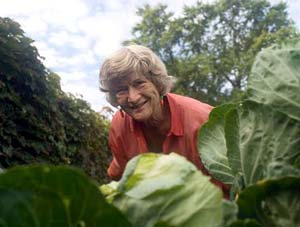In honor of the 30th anniversary of the Organic Foods Production Act, we asked some of the early champions of the modern-day organic movement to reflect on what the label means to them. See the complete essay series here.
The following is essay by Joan Gussow, author, professor emeritus of nutrition and education at Columbia University, and Cornucopia advisory board member.

In trying to articulate what ‘organic’ means to me in my 92nd year, it seemed urgent to try to determine how (whether?) my view of “organic” had changed since I first began to practice—and defend it. And acknowledging that all memory is apt to be fallible at a distance, I went back to uncover what I had said about organic when I began to talk about it publicly—almost 50 years ago.
That was a time when suggesting that the term “organic” meant more than “carbon-containing” was to risk labeling yourself a “food faddist,” a time when newspaper gardening columns patronizingly informed new gardeners that compost was nice for soil texture, but otherwise fairly useless, and that manure was a much less “efficient” source of nutrients than a bag of 5-10-5.
But as the daughter of two escapees from Iowa, who was then gardening in the suburbs of New York, I was a reader of Organic Gardening. And I remember being amused—and baffled—by the title of an article I somehow acquired from our local soil and water specialist—“Soil as an Animal Waste Disposal Medium”—as if introducing dirt to manure was a novel idea.
In 1974, I reluctantly agreed to testify before New York State’s crusty Attorney General about “organics” at a hearing on health food store fraud. Because the focus on “fraud” made the invitation seem an obvious trap—I worked hard on my testimony and, as seemed essential at the time, was careful to enclose the word “organic” in what might be called skeptical quotation marks.
I was arguing on behalf of organic farming, which I had by then been practicing on a small scale for at least a decade. I said that, at that time, there seemed no convincing evidence that organically produced food was—as some of its proponents claimed—more nutritious, so I urged that its merits not be determined by that fact, since its most convincing value lay in its production methods. “It is my understanding,” I testified, “that those who are experimenting with what is called ‘organic farming’ (I prefer the broader term ‘ecologically sound agriculture’) are attempting to develop a modern, high-yielding food production system that will be socially, ecologically and energetically more sustainable than the system we have developed over the last 30 years.” I really couldn’t say it better today.
So what has changed? Well for one thing, organic is no longer a dirty word—it no longer has to be written ironically—in quotation marks. Here is the essence of what I wrote almost 30 years later for Organic Gardening’s 60th anniversary issue, published under the title “The Real Story of ‘O’.” “Organic” was by then a glamour word, I said, usable in almost any setting. There was now a federal standard for what it meant to be “organic,” a standard with every “i” dotted and every “t” crossed. Industrial-scale farms could, therefore, follow the letter of the law and be “certified,” which means that the outputs of organic production can be found in supermarkets across the country and around the world.
But although the “O” word is now academically respectable, state and federal funding for “organic” research remains minimal. More alarmingly, given the entry into the industry of some of the largest multinational food companies, organic seems to be becoming, I wrote, “what we hoped it would be an alternative to,” another industrial food system dedicated to shipping raw materials that are at least ostensibly organic from wherever they can be most cheaply sourced to factories that produce everything from “organic” TV dinners, to “organic” soft drinks.
And then I wrote, and this is almost 20 years ago, “This isn’t what we meant. When we said organic, we meant local. We meant healthful. We meant being true to the ecologies of our regions. We meant mutually respectful growers and eaters. We meant social justice and community. Some insist that the modern world has no place for such niceties. Small-scale organic operations, they declare, will inevitably lose out to what has been called the organic industrial complex. Its output will be delivered to high-volume superstores where locally grown carrots will be undersold by mass produced ‘organic’ carrots from the very folks who brought us purple breakfast cereals with marshmallows .” Unfortunately, I couldn’t say it better today.
Which, alas, bring us to the present. I recently watched an update on what had happened at a recent meeting of the National Organic Standards Board (on which I served from 1995 to 1999) and was painfully reminded of the struggles that have continually confronted those of us who want organic to remain embedded in ecological responsibility.
What to allow on the National List? Tanning waste, in the face of appeals from leather-makers? Composted sewage sludge? I distinctly remember the deep dive Fred Kirschenmann made into the realities of sewage sludge in the 90’s to come up with the list of contaminants—including nuclear waste—that it contained. Hydroponics? How can you call something isolated from its local soils “organic”? CAFO’s? How can you call “organic” something that treats animals so unnaturally while despoiling its local environment? Such blasphemy obviously requires that “organic” be placed once more in ironic quotation marks!

